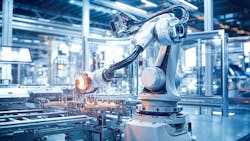How talent with technology can ensure manufacturing’s future
What you’ll learn:
- People design, refine, and reimagine the systems that drive production.
- Manufacturers should prioritize a people-first approach to technology, investing in talent development and workforce adaptability.
- When people are equipped to lead change, technology becomes a tool for progress, not disruption.
At the heart of manufacturing lies a simple reality: while technology may operate autonomously, its advancement is powered by human innovation. Machines and algorithms can perform tasks with precision, but they don’t evolve independently.
It’s people who design, refine, and reimagine the systems that drive production. As these technologies become more advanced, they challenge workers to grow with them—fueling a dynamic cycle of upskilling, reskilling, and reinvention.
Podcast: One expert’s insights on coaching, reliability culture, and overcoming maintenance challenges
Manufacturing is embracing AI, big data, and high-tech tools, making the demand for skilled workers more critical than ever. In the U.S., years of offshoring have created a lack of university and trade programs needed to develop that talent.
Now, with geopolitical shifts and tariffs driving a resurgence in regionalized production, manufacturers face multiple challenges at once: a domestic labor shortage, increasing complexity from shorter product lifecycles, and rising demand for mass customization.
See also: ‘Perception problem’ pours from survey that U.S. manufacturing remains too technologically outdated
However, this moment presents a unique opportunity. Manufacturers that prioritize a people-first approach to technology, investing in talent development and workforce adaptability, are better positioned to meet today’s demands and lead the future of industry.
By empowering professionals and their expertise to create operational improvements, organizations can unlock enterprise-wide innovation through the strength of their subject matter experts, or SMEs.
Podcast: Navigating reshoring in 2025 amid tariff and trade uncertainty
When people are equipped to lead change, technology becomes a tool for progress, not disruption.
Strengthening the workforce with upskilling and education
To meet dynamic business needs, technical talent readiness is essential. Organizations must ensure that they have employees with the right skills in the right place at the right time, and that those individuals are equipped with the knowledge and tools to perform effectively.
Time to productivity should be a key focus, with role-based training and manager toolkits helping new hires contribute to production quickly and confidently.
Still, upskilling is a continuous journey, so investing in a strong pipeline of skilled workers lays the foundation for developing future SMEs. Structured learning paths that guide employees from basic skills to advanced expertise help strengthen operational capabilities and support long-term career growth. As workers upskill to keep pace with technological change, they enhance the efficiency and agility of the systems they use.
But building a sustainable workforce requires more than developing current employees. It also demands investment in the next generation. Companies must go beyond recruitment to actively support education.
Video: Industry 5.0 all about 'human-led innovation'
Collaborating with trade schools and universities on training programs in highly specialized skills, offering internships, and co-developing curriculum content are powerful ways to shape talent. These partnerships help develop the next generation of manufacturing professionals, ensuring they have the skills needed to hit the ground running.
How technology enables workforce agility
As technology continues to evolve, so do the roles employees will fill. Companies must anticipate these shifts by designing training strategies that reflect both current and future needs. The goal is to make knowledge accessible, intuitive, and actionable.
Digital tools are playing a growing role in this transformation. To support real-time learning and enhance day-to-day workflows, companies should explore AI-powered solutions that simplify access to key technical knowledge—such as procedures, training materials and troubleshooting support—through intuitive conversational interfaces that streamline information retrieval and thus improve productivity.
See also: Manufacturers cite widespread labor shortages, use of automation and AI to help
Still, even in highly automated environments, people remain at the center of manufacturing. Engineers are needed to design automation lines, technicians to troubleshoot equipment, and operators to manage processes that machines can’t yet replicate. The perception that machines will replace people misses the point. Technology enhances human capability; it doesn’t eliminate the need for it.
Operational excellence through standardization and local expertise
Today’s manufacturing demands a strategic balance between global consistency and local responsiveness. Standardized processes across manufacturing operations ensure quality, efficiency, and scalability. Simultaneously, empowering site-level teams to adapt those processes to meet unique customer or product needs fosters innovation, agility, and faster problem-solving.
See also: How manufacturers are closing high-skill gaps
This decentralized model allows breakthroughs made in one region to scale across the organization, allowing regions where manufacturing is rapidly expanding—like the U.S.—to benefit from innovations developed elsewhere.
At Jabil, this approach is reflected in a connected network of functional experts across more than 100 factories in over 25 countries. Global centers of expertise define and continuously improve enterprise standards, while regional and site-level experts adapt those standards to their local needs.
Importantly, this structure is not just top-down. It is designed to capture ideas from the factory floor and scale them across the organization. Employees know they can share their insights with site experts, who in turn elevate the best ideas through regional and global channels. This “one-to-few-to-many" model ensures innovation can bubble up from the grassroots and quickly be embedded into day-to-day operations.
See also: Way out of the talent shortage: AI as a catalyst for a workforce surge
To support consistent execution across manufacturing environments, organizations should standardize end-to-end processes and develop resources that can be translated into functional playbooks, step-by-step guides outlining team-level activities. These playbooks can serve as a comprehensive toolkit that simplifies implementation and accelerates productivity.
However, standardization alone isn’t enough. Manufacturers must also ensure visibility into their workforce capabilities. Tools such as skills matrices, evaluation processes, and technical talent dashboards help managers identify where talent resides and how it can be mobilized when production needs change across the company.
See also: Human-centered design’s critical role in both digital and sustainability transformation
Technology may accelerate change, but it’s people who steer the course. In manufacturing, success depends not only on the tools we use, but on the talent, insights, and adaptability of the teams behind them.
By investing in workforce development, embracing decentralized innovation, and balancing global standards with flexibility to meet local requirements, companies can build more resilient operations.
When people drive technology forward, technology drives people further—and together, they shape a stronger manufacturing future.
About the Author

Summer Rawlins
Summer Rawlins is senior director of global operations strategy and enablement at Jabil, a global manufacturing solutions provider with operations in more than 25 countries. Rawlins is a leader in organizational strategy and business transformation, with a career spanning 25-plus years across several industries. Her expertise includes business and process transformation, change management, communications, and organizational effectiveness.
